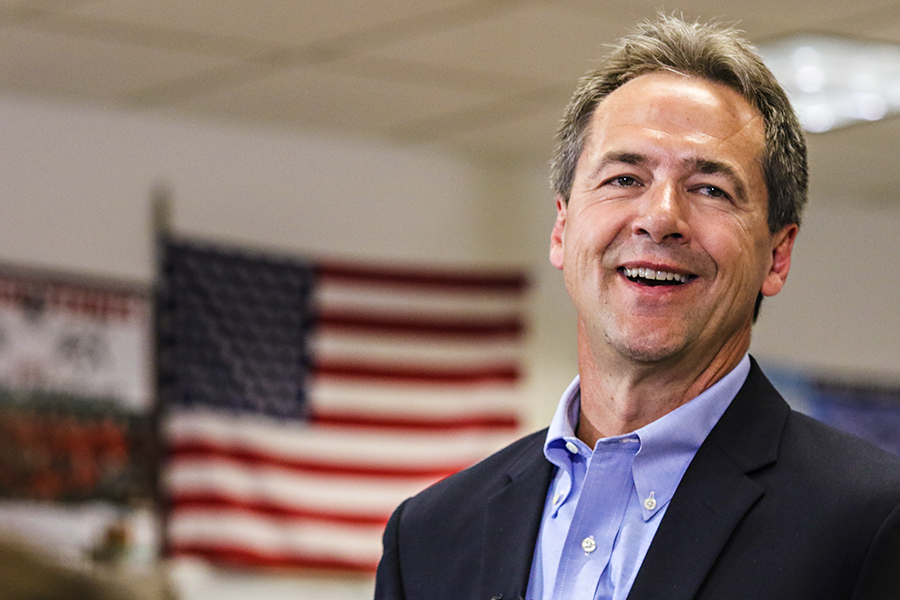HELENA — Montana Gov. Steve Bullock said Monday he will run against first-term Republican Sen. Steve Daines, giving Democrats a boost in their effort to take control of the Senate in November.
Bullock’s decision to run is an about-face made at the last minute for the two-term governor, who ended his long-shot bid for president in December and had repeatedly insisted he had no interest in running for the Senate.
“After hearing from Montanans and talking to Lisa and our kids, we decided now is no time to be on the sidelines, and that’s why I’m running so we can make Washington work more like Montana,” Bullock said, referencing his wife, in a statement announcing his candidacy.
Bullock had come under increasing pressure since dropping his presidential bid, including meeting with former President Barack Obama in Washington and with Senate Minority Leader Chuck Schumer.
Schumer, of New York, recently traveled to Montana to meet with Bullock, who reportedly weighed the matter with his family over the weekend before making his decision.
Democrats need to win four seats now held by Republicans, without losing any that they are defending, to win outright control of the Senate. If President Donald Trump is defeated, the Democrats would need a net gain of three seats and the vice-president’s tie-breaking vote for control.
Bullock planned to walk across the hall from his office in the state Capitol to file his paperwork on Monday, the final day for candidates to register in Montana.
A campaign ad released Monday said Bullock wants to “make Washington work like Montana” and touted the state’s low unemployment and expanding economy during his tenure as governor. The ad also highlighted legislative achievements, such as Medicaid expansion and revising the state’s campaign finance laws to increase reporting requirements by political committees.
Bullock is running for the seat formerly held by Democrat Max Baucus. Baucus, the former U.S. ambassador to China, said the meeting of Schumer, Bullock and their wives was key to the decision, but he did not know the substance of those talks.
But Bullock told Lee Newspapers of Montana on Sunday that Senate Majority Leader Mitch McConnell “probably served as more of a motivation to me than Chuck Schumer or anybody else.”
Baucus also said it “probably helped” that former Vice President Joe Biden has surged in the Democratic presidential primary race, making it less likely that self-described democratic socialist Vermont Sen. Bernie Sanders will lead the ticket in the strongly pro-Trump state.
Bullock becomes the most prominent candidate in the Democratic primary race, which also included public health expert Cora Neumann and Helena Mayor Wilmot Collins. Neumann announced shortly after Bullock’s announcement that she was dropping out of the race, and urged the party to unite behind the governor.
Daines has the backing of Trump, for whom the state overwhelmingly voted in 2016. Trump has tweeted his support for Daines, who recently met with the Republican president at the White House.
Daines’ campaign manager, Shane Scanlon, did not directly respond to Bullock’s decision in a comment to The Associated Press.
“We’re going to win this race because Steve Daines is always on Montana’s side fighting for more high-paying jobs, against big government and defending Montanans’ way of life,” Scanlon said.
As Bullock frequently pointed out during his presidential campaign, he was the only Democratic governor to win reelection in a state Trump won in 2016. Trump also traveled to Montana four times to campaign against incumbent Democratic Sen. Jon Tester in the 2018 election, but Tester won, anyway.
Republicans started the campaign against Bullock by saying he caved to party leaders to run for a job he doesn’t want.
“Governor Bullock is nothing more than Chuck Schumer’s puppet,” Montana Republican Party Executive Director Spenser Merwin said. “If it only took one trip to Montana to bully him into running for Senate, can you imagine how easy it will be to get Bullock to vote for the Democrats’ socialist agenda.”
